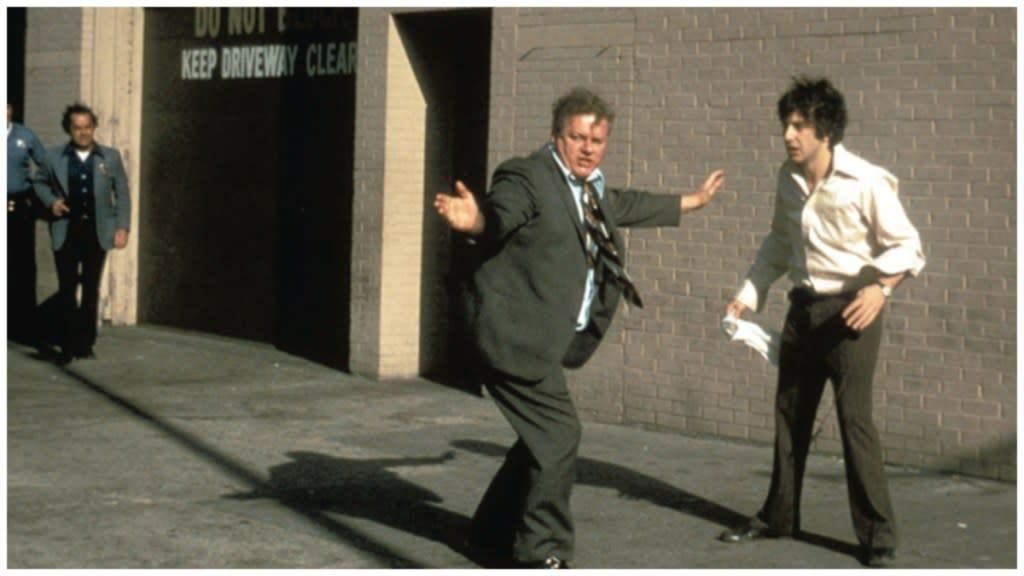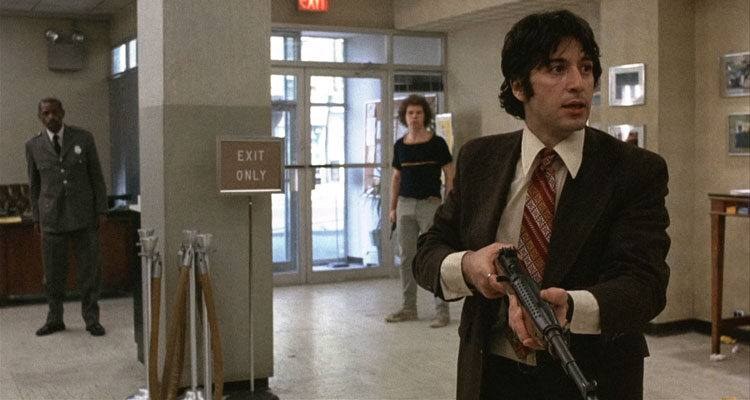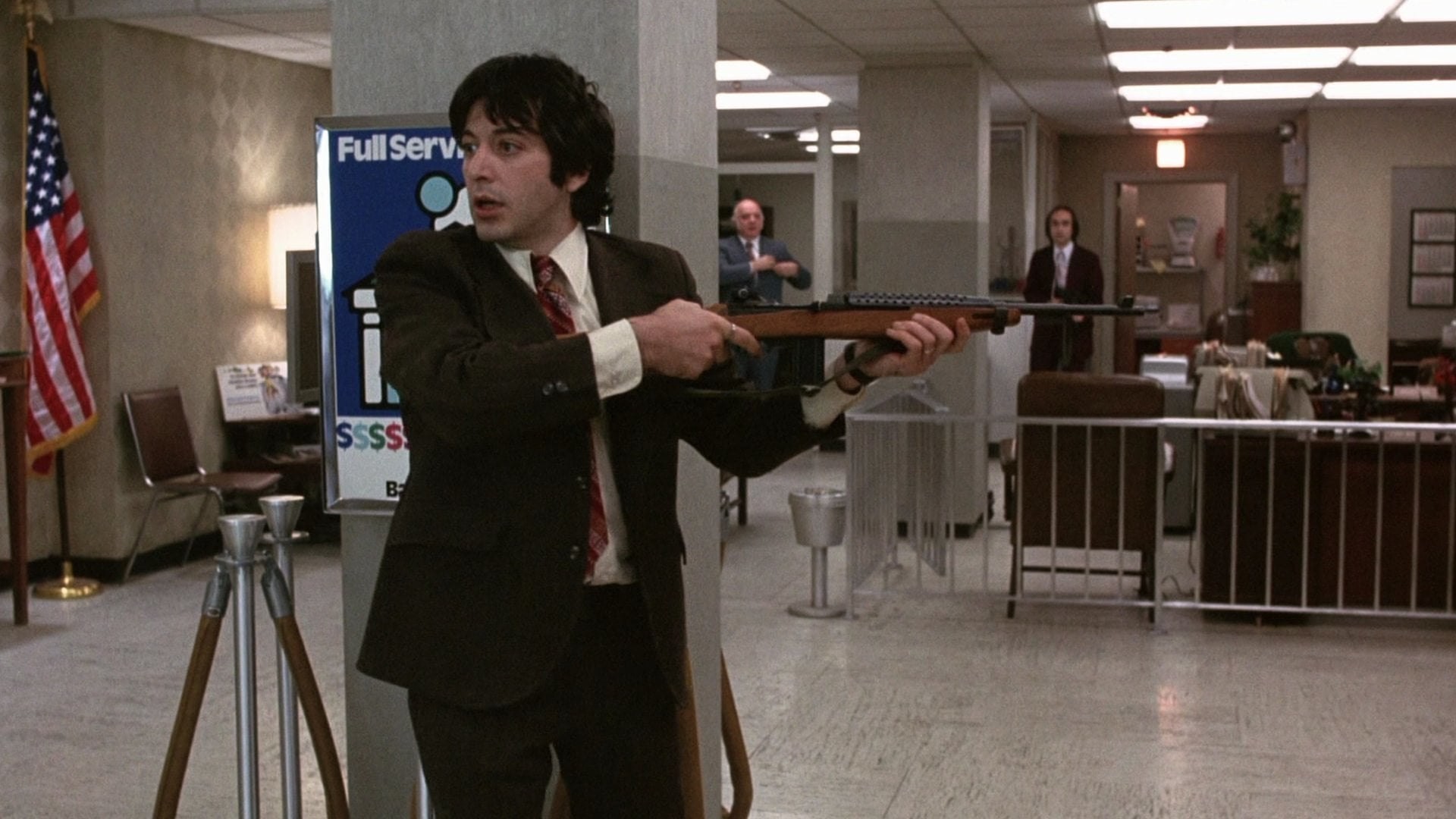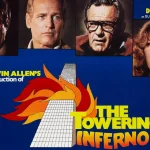Dog Day Afternoon (1975)

Dog Day Afternoon is a 1975 American crime-comedy film directed by Sidney Lumet and written by Frank Pierson. Produced by Martin Bregman and Martin Elfand, the film stars Al Pacino, John Cazale, and Charles Durning. Based on a real-life bank robbery that took place in Brooklyn, New York, the film presents a captivating and unconventional look at a botched heist, turning an intense crime story into a darkly humorous exploration of human nature and societal pressures.
The film revolves around Sonny Wortzik (Al Pacino), a man who attempts to rob a bank in order to pay for his partner’s gender reassignment surgery. The robbery quickly goes awry when the police surround the bank, and the situation spirals into a tense hostage standoff. Over the course of the film, Sonny, along with his anxious accomplice Sal (John Cazale), navigates escalating pressure from the police, the media, and the hostages inside the bank. As the story unfolds, Sonny becomes a reluctant celebrity, with the public becoming more interested in his motivations and personal life than the crime itself.
One of the central themes in Dog Day Afternoon is the exploration of personal identity and the internal struggles that accompany it. Sonny’s decision to rob the bank is driven by his desire to help his partner, Leon (Chris Sarandon), undergo a gender reassignment surgery. The film delves into the emotional and psychological toll of trying to meet societal expectations while grappling with personal desires. Sonny’s conflict highlights themes of love, loyalty, and identity, providing a deeper, more human understanding of his motivations behind the robbery.
Dog Day Afternoon skillfully balances tension with dark humor, making the story even more compelling. The robbery is chaotic from the start, and the increasingly absurd situations that arise during the standoff add an element of comedy to the film. Sonny’s interactions with the hostages, the police, and the media are filled with moments of both frustration and absurdity. The humor arises from the awkwardness of the situation, as well as the characters’ attempts to make sense of the rapidly escalating crisis. However, the film never loses sight of the serious nature of the crime, making the combination of tension and humor both effective and impactful.

The role of the media is another important theme in Dog Day Afternoon. As the robbery turns into a public spectacle, the media takes an increasing interest in Sonny’s motivations and personal life. The film comments on the way the media can sensationalize events and shape public perception, often focusing more on personal drama than on the actual crime itself. As reporters and camera crews flood the scene, they create an almost circus-like atmosphere, which only adds to the absurdity of the situation. This critique of the media’s influence on public events is one of the film’s more subtle yet powerful elements.

The performances in Dog Day Afternoon are one of its standout features. Al Pacino’s portrayal of Sonny is both intense and deeply empathetic, capturing the character’s vulnerability, desperation, and moments of humor. John Cazale’s performance as Sal, Sonny’s troubled accomplice, complements Pacino’s energy, creating a dynamic that is both tragic and relatable. The character development throughout the film allows viewers to connect with Sonny on a personal level, understanding his struggles and motivations despite his criminal actions. The film’s strength lies in its ability to humanize its characters, even in the midst of a crime.

Dog Day Afternoon is a masterfully crafted film that blends crime, comedy, and social commentary. Directed by Sidney Lumet, the film offers an in-depth exploration of personal identity, media influence, and the chaos of human behavior under pressure. With powerful performances from its cast, particularly Al Pacino, the film stands as a compelling and thought-provoking piece of cinema. Dog Day Afternoon remains a timeless classic, offering both entertainment and a critical look at the complexities of identity, loyalty, and the ways in which society shapes individual actions.











